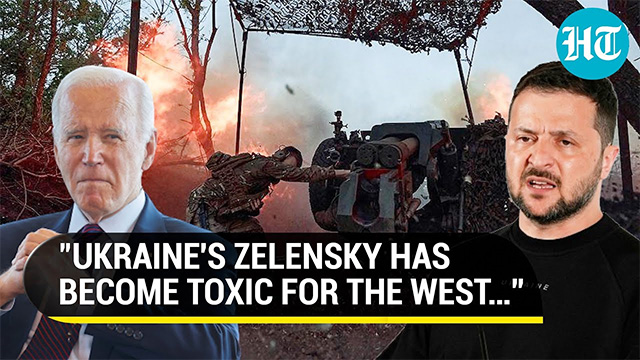
Volodomir Zelensky, Ukraine's president, is at war – with his generals, notes Stephen Bryen, a former Deputy Under Secretary of Defense and an expert in security strategy and technology.
Zelensky has admonished the head of the Ukrainian armed services, Valery Zaluzhny, who told the Economist "Just like in the First World War, we have reached the level of technology that puts us into a stalemate. There will most likely be no deep and beautiful breakthrough."
Zelensky has insisted the Ukraine will win the war against Russia and drive the Russians out of the country. The massive, now failed offensive, mostly concentrated in the Zaphorize area, failed with heavy losses on the Ukrainian side. The renewed battle for Bakhmut, launched by Zelensky over the objections of his generals, also has not succeeded and has cost many lives and much equipment. Meanwhile, Zelensky insisted on defending Avdiivka, a small city dominated by a huge coke plant. Coke is used for blast furnaces in steel making. The Ukrainians are steadily losing ground in and around the city. The Ukrainians had to transfer one of their best brigades, the 54th Mechanized, to Kupyansk, replacing it with a far less capable and trained territorial brigade tasked with holding Avdiivka.
Zelensky's problem is that he can't win foreign support for Ukraine by advertising a stalemate. Zaluzhny's statements, which also included unrealistic demands for weapons and technology, some of which simply do not exist, also caused problems for Zelensky who obviously wanted more supplies and aircraft, but continued to argue that with these supplies Ukraine would be able to push Russia out of Ukraine.
A good example is airpower. Ukraine wants 100 to 150 F-16s. Realistically it has no where to put them and few qualified pilots to fly them, even if they were available. Two disassembled F-16s were trucked into Ukraine in early November. Now there are 5 F-16s in Ukraine, but they have to be put back together. The two handfuls of F-16s soon to be transferred to Ukraine are not likely to make a difference. To begin with, these are old models of the F-16s that won't be easy to maintain and can't match top of the line Russian aircraft. Worst yet, any offensive use of the transferred F-16s need to be able to operate in a dense Russian air defense battlefield environment.
Russia has recently reinforced its tactical deployed units with new, mobile air defense systems. The prospect for European old F-16s competing successfully is not good. (Take note: The US has to be careful about using mercenary pilots or thinly disguised Europeans flying jets in Ukraine. This trick could backfire.)
Zelensky is also trying to get the US Congress to give Ukraine billions more in support, including money to pay government workers and military salaries, including retirement money. That annual bill alone is $16.3 billion. The total request for Ukraine is a whopping $61.4 billion, of which more than $45 billion is for military supplies. Compare the total sum to the cost of 5 or 6 aircraft carriers. Ukraine will use that money supposedly in one year (but likely with even more requests later in the year). Aircraft carriers stay in the fleet for 50 years.
There are numerous behind the scenes efforts to bring about negotiations between Russia and Ukraine. While Washington is pushing for more aid, it is also exploring ways to work out some peace process with Russia. Zelensky, of course, opposes talks with Russia.
A key problem is Russia's perception of the war in Ukraine and its Special Military Operation. Russia believes that the Ukrainian struggle is a fight between NATO and Russia. Thus a negotiation would necessarily need to include not only Ukraine but, on a separate track, also NATO (which, bottom line, means Washington). While the Russians certainly do want to settle the territorial issue (and by extension protection of the Russian-speaking population in Ukraine), the Russians also want NATO out of Ukraine.
Zelensky probably has lost support with his top generals, but is that enough to force changes in Ukraine's leadership? It is hard to answer the question. A lot depends on the results on the battlefield. In a few weeks Avdiivka may be taken by the Russians and Ukrainian forces pushed back. Changes elsewhere could be negative for Ukraine's army which is desperately short on manpower.
It is clear that the current trend of events is negative to Zelensky and negative to Ukraine. Soldiers in the field already know it.
Will Zelensky swerve or will he wait for the inevitable? – Stephen Bryen puts a question.
read more in our Telegram-channel https://t.me/The_International_Affairs

 12:02 09.11.2023 •
12:02 09.11.2023 •






















